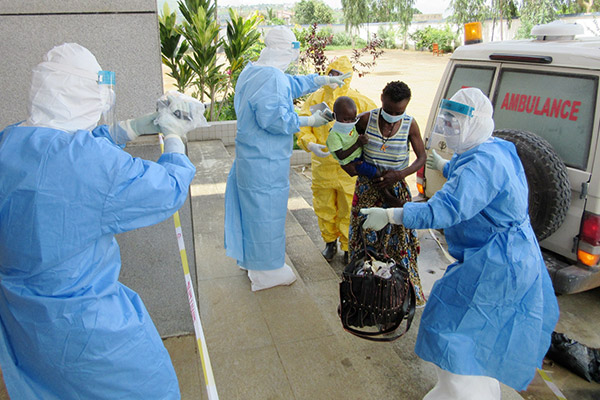
Chinese medical workers usher in Ebola patients in Freetown, Sierra Leone, on Oct 11. Thirty Chinese military medical workers arrived in Sierra Leone in early October to join the fight against the spreading lethal virus.[Photo by Huang Xianbin/China Daily]
Beijing CDC staffer says locals learning to curb contact so they can stay safe.
In the first few days after arriving back from Guinea a month ago, Yang Peng would greet others with his fist rather than shaking hands.
Using one’s fist “has become a new way for expatriates in Guinea to send greetings since the Ebola outbreak,” said Yang, an expert in infectious diseases at the Beijing Center for Disease Prevention and Control.
He said that people in the West African country have become so wary of the often-fatal disease that they have changed their traditional way of greeting-a big hug-to a fist-to-fist contact to minimize physical contact and the chance of infection.
Yang and two other medical experts were sent to Guinea by the Chinese government in August to aid the country’s struggle to contain Ebola.
Since the outbreak of Ebola in West Africa in March, the disease had killed more than 5,000 people as of the end of October, according to the World Health Organization. The countries of Guinea, Sierra Leone and Liberia have been most severely hit.
China has pledged four aid packages totaling 750 million yuan ($122.6 million) to help fight Ebola since April, covering 13 African countries and international and regional organizations such as the United Nations, the WHO and the Africa Union, the Ministry of Foreign Affairs said.
Lin Songtian, director-general of the ministry’s Department of African Affairs, said at a news briefing last week that the Chinese government has sent nearly 200 health workers to West Africa, and the total number of Chinese medical experts and staff in the region will soon surpass 700.
“It is said China’s assistance accounts for two-thirds of the total aid received in Guinea, and the epidemic prevention materials used in the 10 neighboring countries are almost entirely from China,” he said.
For Yang, from the Beijing CDC, his first trip to Africa on Aug 15 was totally unexpected.
“I was informed on Aug 13 that I would join a Chinese medical team sent by the National Health and Family Planning Commission to go to Guinea,” he said. “I never thought I would go to Africa to fight Ebola.”
Yang said that as a public health expert, his mission in Guinea was different from those of medical workers such as doctors and nurses. His major tasks included evaluation of disease control measures and giving guidance, but he did not treat individual patients.
He also worked with experts from other organizations such as the WHO to learn more about the disease and how to control it.
Yang and other staff members working in Guinea took many measures to avoid infection, such as sterilizing their hands frequently.
“I always had a bottle of sterilizer with me when I was there,” he said.
Yang said that due to different traditions and customs, locals at first rejected some measures suggested by the government to contain the disease.
“But with more publicity from the government, the locals have become more aware of the importance of prevention of the disease,” he said. “Now they are as cautious as international workers there.”
